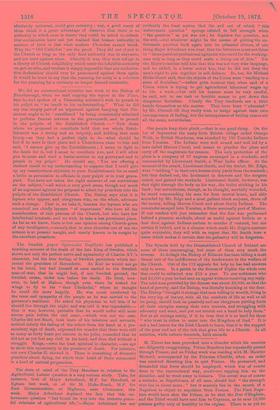The Swedish paper Sydsvenska Dagbladet has published a touching account
of the death of the late King of Sweden, which shows not only the perfect nerve and equanimity of Charles XV.'s character, but the true feeling of Swedish patriotism which ani- mated the grandson of Bernadotte. At Kiel he would not go to his hotel, but had himself at once carried to the Swedish man-of-war, that he might feel, if not Swedish ground, the Swedish ocean, under him before his death. He lived, how- ever, to land at Malmo, though even there he wished for wings to fly to his "dear Ubriksdal," where he thought he could die more happily. He was much comforted by the tears and sympathy of the people as he was carried to the governor's residence. He asked his physician to tell him if he should live through the night, and was told it was improbable,— that it was, however, probable that he would suffer still more severe pain before the end came,—which was not the case. Charles did not flinch, took leave of his relatives and servants, noticed calmly the fading of the colour from his hand as a pre- monitory sign of death, expressed his wonder that there were still so many as forty beats per minute in his pulse, remarked that he did not as yet feel any chill in his head, and then died without a struggle. Kings,—even the least spiritual in character,—are apt to show this equanimity in the presence of death. For instance, our own Charles IL showed it. There is something of dramatic grandeur about dying, for which their habit of State ceremonial is a kind of natural preparation.


































 Previous page
Previous page